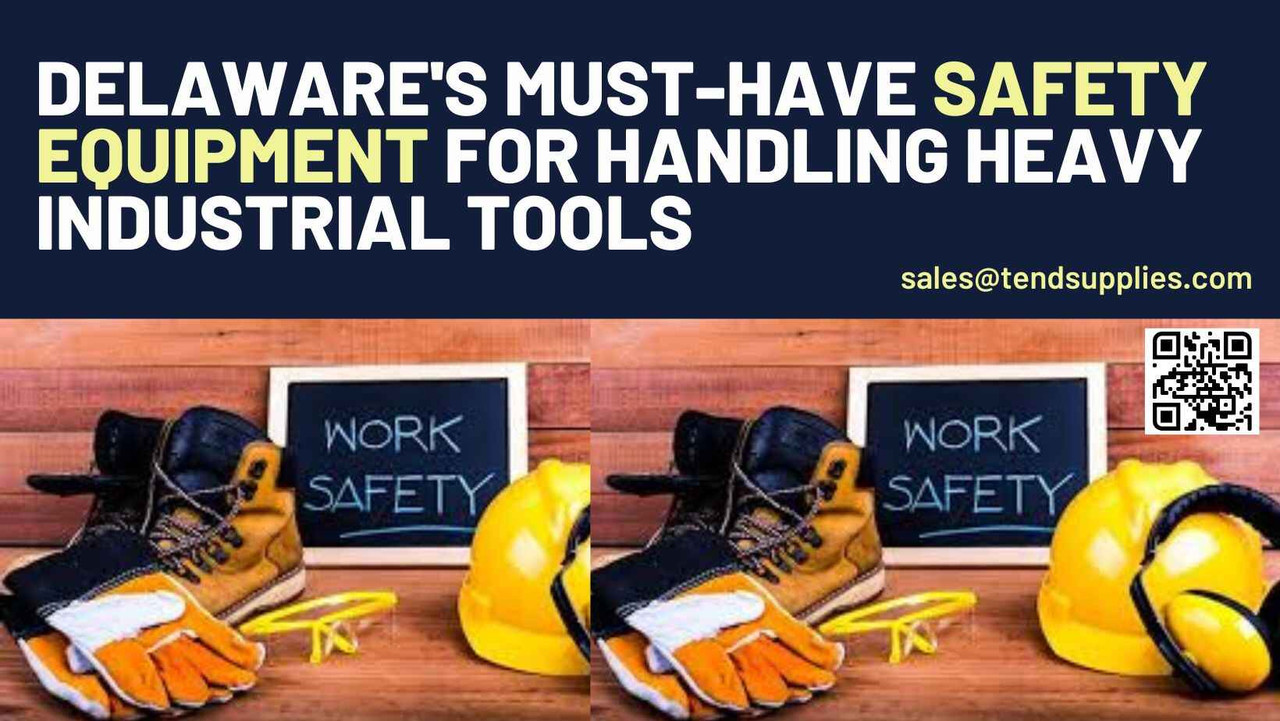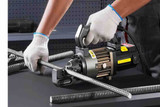Delaware's Must-Have Safety Equipment for Handling Heavy Industrial Tools
In Delaware's thriving industrial sector, the proper use of heavy industrial tools is crucial for productivity and efficiency. However, with great power comes great responsibility, and safety should always be the top priority. This comprehensive guide will explore the essential safety equipment required for handling heavy industrial tools in Delaware, ensuring workers' protection and compliance with state and federal regulations.
1. Personal Protective Equipment (PPE)
Personal Protective Equipment forms the first line of defense against workplace hazards. When handling heavy industrial tools, the following PPE is essential:
a) Head Protection
- Hard hats certified by ANSI Z89.1
- Impact-resistant and electrically insulated options for specific environments
b) Eye and Face Protection
- Safety glasses with side shields
- Full-face shields for tasks with high debris risk
- Goggles for protection against chemical splashes
c) Hearing Protection
- Earplugs for moderate noise levels
- Earmuffs for high-decibel environments
- Custom-molded earplugs for prolonged use
d) Hand Protection
- Cut-resistant gloves for handling sharp materials
- Impact-resistant gloves for heavy tool operation
- Heat-resistant gloves for high-temperature tasks
e) Foot Protection
- Steel-toed boots certified by ASTM F2413-18
- Slip-resistant soles for improved traction
- Metatarsal guards for additional foot protection
f) Respiratory Protection
- Disposable dust masks for light particulate protection
- Half-face respirators for protection against harmful fumes
- Full-face respirators for environments with airborne hazards
2. Workplace Safety Equipment
Beyond personal protective gear, the following equipment is crucial for maintaining a safe work environment:
a) Fall Protection Systems
- Full-body harnesses for working at heights
- Self-retracting lifelines for increased mobility
- Guardrails and safety nets for open-sided platforms
b) Machine Guards
- Fixed guards for stationary machinery
- Adjustable guards for versatile protection
- Interlocking guards with automatic shut-off features
c) Emergency Eyewash Stations and Showers
- Easily accessible eyewash stations
- Combination eyewash and shower units for full-body decontamination
- Portable eyewash bottles for immediate response
d) Fire Safety Equipment
- ABC-rated fire extinguishers strategically placed
- Fire blankets for small fires or personal protection
- Automated fire suppression systems for high-risk areas
e) First Aid Kits
- ANSI/ISEA Z308.1-2015 compliant first aid kits
- Burn treatment supplies for welding and cutting operations
- Automated External Defibrillators (AEDs) for cardiac emergencies
3. Tool-Specific Safety Devices
Different heavy industrial tools require specific safety features:
a) Power Tool Safety
- Ground Fault Circuit Interrupters (GFCIs) for electrical tools
- Dead man's switches for continuous operation tools
- Blade guards for circular saws and grinders
b) Pneumatic Tool Safety
- Air pressure regulators to maintain safe operating pressures
- Whip checks for high-pressure air hose connections
- Noise reduction mufflers for air exhaust
c) Hydraulic Tool Safety
- Pressure relief valves to prevent over-pressurization
- Hydraulic fluid level indicators for proper operation
- Lockout/tagout devices for maintenance procedures
d) Welding and Cutting Safety
- Welding screens to protect nearby workers from arc flash
- Flashback arrestors for oxy-fuel cutting systems
- Fume extraction systems for indoor welding operations
4. Environmental Safety Controls
Controlling the work environment is crucial for overall safety:
a) Ventilation Systems
- Local exhaust ventilation for capturing contaminants at the source
- General ventilation for overall air quality improvement
- Explosion-proof fans for hazardous environments
b) Lighting
- Task lighting for detailed work areas
- High-bay LED lighting for large industrial spaces
- Emergency lighting systems for power outage situations
c) Non-Slip Flooring
- Anti-fatigue mats for standing work areas
- Textured epoxy coatings for improved traction
- Grated walkways for areas prone to liquid spills
d) Noise Control
- Sound-absorbing panels for reducing echo and reverberation
- Acoustic enclosures for noisy machinery
- Vibration dampening mounts for equipment
5. Safety Monitoring and Alert Systems
Implementing monitoring systems enhances overall workplace safety:
a) Gas Detection Systems
- Fixed gas detectors for continuous monitoring
- Portable gas monitors for confined space entry
- Multi-gas detectors for comprehensive protection
b) Emergency Communication
- Public address systems for facility-wide announcements
- Two-way radios for team communication
- Emergency call buttons in isolated work areas
c) Video Surveillance
- CCTV systems for monitoring high-risk areas
- Motion-activated cameras for after-hours security
- Thermal imaging cameras for detecting hot spots in electrical systems
Safety Equipment Maintenance and Inspection
Regular maintenance and inspection of safety equipment are crucial for ensuring its effectiveness:
Inspection Schedule
| Equipment Type | Inspection Frequency | Key Inspection Points |
| PPE | Daily | Wear and tear, proper fit, cleanliness |
| Fall Protection | Before each use | Integrity of straps, hooks, and anchors |
| Fire Extinguishers | Monthly | Pressure gauge, seal integrity, accessibility |
| First Aid Kits | Monthly | Stock levels, expiration dates, cleanliness |
| Machine Guards | Weekly | Proper alignment, secure fastening, damage |
| Gas Detectors | Daily (or before each use) | Battery level, sensor response, calibration |
Delaware-Specific Regulations
While following federal OSHA standards, Delaware has specific regulations and emphasis programs:
- Delaware's Department of Labor enforces the Delaware Workplace Safety Program, which offers insurance premium discounts for companies with exemplary safety records.
- The state's Hazardous Chemical Information Act requires employers to maintain Safety Data Sheets (SDS) and provide employee training on hazardous substances.
- Delaware OSHA (OSHA) conducts targeted inspections in high-hazard industries, including manufacturing and construction sectors.
- The state emphasizes fall protection in construction, with specific focus on residential construction projects.
- Delaware requires employers to report any work-related amputation, loss of an eye, or hospitalization within 24 hours.
Related Articles:
- Mastering Workshop Safety: Essential Tips and Equipment for Tool Handling
- Essential Safety Tips for Using Power Tools and Hand Tools in Your Workshop
- Hand Tools Safety 101: A Comprehensive Checklist
- Best Strategies for Pneumatic Tools Safety
- The Importance of Safety When Using Pneumatic Air Tools
FAQs:
1. How often should safety equipment be replaced in a Delaware industrial setting?
The replacement frequency depends on the specific equipment and usage. Generally, PPE should be replaced immediately if damaged or worn. Hard hats typically need replacement every 5 years, safety glasses annually, and fall protection harnesses every 5 years or according to manufacturer recommendations.
2. Are there any safety equipment requirements specific to Delaware that differ from federal OSHA standards?
While Delaware follows federal OSHA standards, the state has additional emphasis programs, such as the Delaware Workplace Safety Program. This program offers insurance premium discounts for companies maintaining high safety standards, encouraging businesses to go beyond minimum requirements.
3. What are the consequences of non-compliance with safety equipment regulations in Delaware?
Non-compliance can result in OSHA citations, fines, and potential legal liability. Fines can range from a few thousand dollars for minor violations to tens of thousands for willful or repeated violations. More importantly, non-compliance increases the risk of workplace injuries or fatalities.
4. How can small businesses in Delaware afford all the necessary safety equipment?
Small businesses can take advantage of Delaware's Workplace Safety Program for insurance premium discounts. Additionally, phased implementation of safety measures, leasing equipment, and participating in co-op purchasing programs with other small businesses can help manage costs while ensuring compliance.
5. What training is required for employees using heavy industrial tools in Delaware?
Employees must receive training on proper tool use, associated hazards, and correct use of PPE. This includes OSHA-mandated training on topics like Hazard Communication, Lockout/Tagout, and specific tool operation. Employers must document all training and conduct regular refresher courses.
Conclusion:
Ensuring the safety of workers handling heavy industrial tools in Delaware requires a comprehensive approach to safety equipment and practices. By investing in quality PPE, implementing proper workplace safety measures, and staying compliant with state and federal regulations, businesses can create a safer work environment, reduce accidents, and improve overall productivity.
Ready to upgrade your safety equipment and protect your workforce? Visit Tend Industrial Supplies at tendsupplies.com for a wide selection of top-quality safety gear and industrial tools. Our experts can help you select the right equipment to meet Delaware's safety standards and your specific industry needs. Don't compromise on safety – invest in the best protection for your team today!









